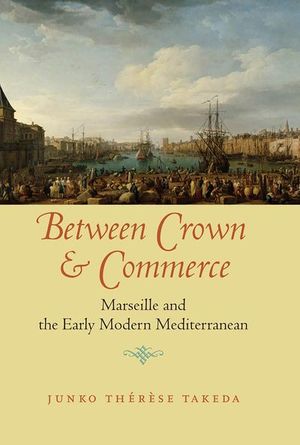Between Crown & Commerce
Published by Johns Hopkins University Press
This “carefully argued and well-written study” examines French royal statecraft in the globalizing economy of the early modern Mediterranean (Choice).
This is the story of how the French Crown and local institutions accommodated one another as they sought to forge acceptable political and commercial relationships. Junko Thérèse Takeda tells this tale through the particular experience of Marseille, a port the monarchy saw as key to commercial expansion in the Mediterranean.
At first, Marseille’s commercial and political elites were strongly opposed to the Crown’s encroaching influence. Rather than dismiss their concerns, the monarchy cleverly co-opted their civic traditions, practices, and institutions to convince the city’s elite of their important role in Levantine commerce. Chief among such traditions were local ideas of citizenship and civic virtue. As the city’s stature throughout the Mediterranean grew, however, so too did the dangers of commercial expansion as exemplified by the arrival of the bubonic plague. During the crisis, Marseille’s citizens reevaluated merchant virtue, while the French monarchy found opportunities to extend its power.
Between Crown and Commerce deftly combines a political and intellectual history of state-building, mercantilism, and republicanism with a cultural history of medical crisis. In doing so, the book highlights the conjoined history of broad transnational processes and local political change.
This is the story of how the French Crown and local institutions accommodated one another as they sought to forge acceptable political and commercial relationships. Junko Thérèse Takeda tells this tale through the particular experience of Marseille, a port the monarchy saw as key to commercial expansion in the Mediterranean.
At first, Marseille’s commercial and political elites were strongly opposed to the Crown’s encroaching influence. Rather than dismiss their concerns, the monarchy cleverly co-opted their civic traditions, practices, and institutions to convince the city’s elite of their important role in Levantine commerce. Chief among such traditions were local ideas of citizenship and civic virtue. As the city’s stature throughout the Mediterranean grew, however, so too did the dangers of commercial expansion as exemplified by the arrival of the bubonic plague. During the crisis, Marseille’s citizens reevaluated merchant virtue, while the French monarchy found opportunities to extend its power.
Between Crown and Commerce deftly combines a political and intellectual history of state-building, mercantilism, and republicanism with a cultural history of medical crisis. In doing so, the book highlights the conjoined history of broad transnational processes and local political change.
BUY NOW FROM
COMMUNITY REVIEWS

